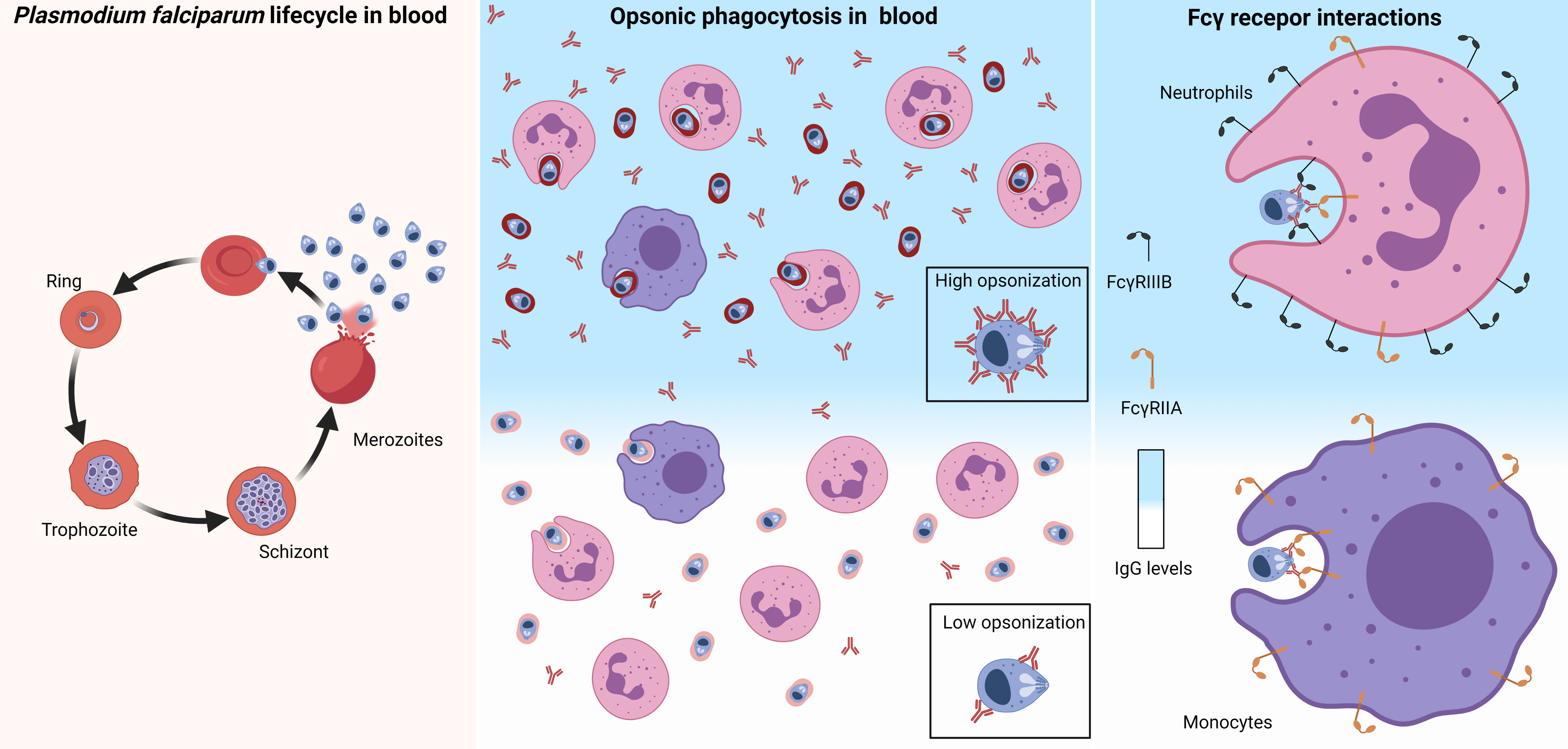Neutrophils dominate in phagocytosis-mediated protection against febrile malaria
Published in Microbiology

By Asier Garcia-Senosiain, Subhash Singh, and Michael Theisen

Figure created with BioRender
Exploring the role of blood leukocytes in immunity against febrile malaria
Five species of the protozoan parasites of the genus Plasmodium cause malaria in humans, of which Plasmodium falciparum alone accounts for >99% of the malaria cases in Africa, and is responsible for over 93% of all malaria deaths. The asexual development of P. falciparum parasites in human blood is responsible for all clinical disease symptoms and death [1]. This asexual parasite development happens within erythrocytes, and upon completion of the intra-erythrocytic multiplication daughter merozoites (the extracellular parasite progenies) are released, which quickly invade new erythrocytes (Figure, left panel).
Naturally Acquired Immunity (NAI) against febrile malaria occurs in endemic regions after multiple infections over years, and it is understood to be mediated by antibodies, mostly of the IgG class. However, the mechanisms through which these protective IgG confer immunity remain elusive [2, 3]. Earlier studies indicated that anti-parasite IgGs may directly prevent merozoite invasion in erythrocytes [4]. Now, there is an increasing acceptance that antibodies may also collaborate with leukocytes to eliminate parasite from the blood.
Anti-parasite IgG, particularly of the cytophilic subclasses (IgG1 and IgG3), are understood to act in co-operation with leukocytes through the Fc gamma receptors (FcγR) present on the surface of these immune cells [5]. There are variations in the types and levels of FcγRs expressed on different leukocyte subsets neutrophils [6], and additionally these FcγRs display different binding affinities to Fc domains of cytophilic antibodies [7]. Engagement of different FcγRs on surfaces of different leukocyte subpopulations, thereby trigger different cellular responses ranging from production of soluble factors [8] and / or phagocytosis [9-11] leading to killing of parasites. Most of the cell-based bioassays investigating IgG mediated parasite killing have relied on the use of pre-selected cell types such as monocytes [8, 12] or neutrophils [13], or use of permanent cell lines belonging to a definite lineage [13]. We have for the first time analyzed the contribution of different human leukocyte subsets in mediating IgG-dependent phagocytosis of merozoites using an unbiased ex vivo bioassay consisting of natural distribution of leukocytes from peripheral human blood samples.
The degree of antibody opsonization influences merozoite-phagocytosis by neutrophils or monocytes
Using an in vitro phagocytosis assay, which included all peripheral blood leukocytes (in proportion to their normal composition in peripheral blood) we investigated the role of different cell types and their respective FcγRs in IgG mediated phagocytosis of blood-stage P. falciparum merozoites. We identified neutrophils and monocytes as the two major phagocytic cell types, and that the levels of antibodies deposited on the merozoite surface determined which cell type played the dominant phagocytic role. Higher levels of antibody deposition on merozoites, stimulated neutrophils to play a dominant phagocytic role, while at lower antibody levels monocytes played the dominant phagocytic role (Figure, middle panel). While our work was being finalized for publication, another recent study reported that peripheral blood neutrophils in a whole-leukocyte assay play a prominent role in the clearance of P. falciparum sporozoites demonstrating their role in pre-erythrocytic stage malaria immunity [14]. Collectively, these studies highlight the importance of IgG mediated activation of neutrophils mediated phagocytosis of malaria parasites, a phenomenon which remained under appreciated so far in our understanding about immunity against malaria.
Phagocytosis is mediated by different FcγR in neutrophils and monocytes
Human monocytes and neutrophils both express FcγRIIA with a subset of monocytes expressing FcγRIIIA, while FcγRIIIB expression is exclusive to neutrophils [6]. We found that anti-FcγRIII antibodies efficiently blocked merozoite-phagocytosis by neutrophils demonstrating that this is the main receptor for antibody-mediated phagocytosis by neutrophils. Interestingly, anti-FcγRIIA antibodies enhanced the blocking activity of anti-FcγRIII antibodies suggesting that both these FcγRs act in concert in neutrophils. Our blocking experiments also demonstrated that FcγRIIA was the sole receptor for mediating phagocytosis of merozoites by monocytes. We therefore hypothesize that differences in FcγR density as well as specificity and affinity towards IgG subclasses might explain the different thresholds for merozoite-phagocytosis by neutrophils and monocytes, respectively (Figure, right panel).
IgG-dependent phagocytosis by neutrophils contributes to protection from febrile malaria
Further, using the phagocytosis assay we tested association between IgG-dependent opsonic phagocytosis of blood-stage P. falciparum merozoites and protection against febrile malaria in two different longitudinal cohort studies (LCSs) performed in two diverse geographical regions, Ghana and India, respectively. We found that this IgG dependent opsonic phagocytosis activity by neutrophils was strongly associated with protection against febrile malaria in both LCSs, again demonstrating the importance of the IgG mediated neutrophil phagocytosis in immunity against malaria through use of immune-epidemiological observations.
In conclusion, our findings highlight a new and important mechanism of action for the protective role of IgG against malaria, which involves triggering enhanced opsonic phagocytosis of parasites by neutrophils, which acts in concert with other IgG-mediated parasite killing mechanisms.
The full paper can be read at: https://www.nature.com/articles/s42003-021-02511-5
References
- Mackintosh, C.L., J.G. Beeson, and K. Marsh, Clinical features and pathogenesis of severe malaria. Trends Parasitol, 2004. 20(12): p. 597-603.
- McGregor, I.A., S.P. Carrington, and S. Cohen, Treatment of East African P. falciparum malaria with West African gammaglobulin. Trans. R. Soc. Trop. Med. Hyg., 1963. 57: p. 170-175.
- Cohen, S., A. McGregor, and S. Carrington, Gamma globulin and aquired immunity to human malaria. Nature, 1961. 192: p. 733-737.
- Holder, A.A., The carboxy-terminus of merozoite surface protein 1: structure, specific antibodies and immunity to malaria. Parasitology, 2009. 136(12): p. 1445-56.
- Pleass, R.J. and J.M. Woof, Fc receptors and immunity to parasites. Trends Parasitol., 2001. 17(11): p. 545-551.
- Boross, P., et al., Fc Receptors, in Encyclopedia of Life Sciences (ELS). 2008, John Wiley & Sons, Ltd Chichester. p. 1-8.
- Bruhns, P., et al., Specificity and affinity of human Fcgamma receptors and their polymorphic variants for human IgG subclasses. Blood, 2009. 113(16): p. 3716-25.
- Bouharoun-Tayoun, H., et al., Antibodies that protect humans against Plasmodium falciparum blood stages do not on their own inhibit parasite growth and invasion in vitro, but act in cooperation with monocytes. J Exp Med, 1990. 172: p. 1633-1641.
- Hill, D.L., et al., Opsonising antibodies to P. falciparum merozoites associated with immunity to clinical malaria. PLoS One, 2013. 8(9): p. e74627.
- Osier, F.H., et al., Opsonic phagocytosis of Plasmodium falciparum merozoites: mechanism in human immunity and a correlate of protection against malaria. BMC Med, 2014. 12: p. 108.
- Kana, I.H., et al., Breadth of Functional Antibodies Is Associated With Plasmodium falciparum Merozoite Phagocytosis and Protection Against Febrile Malaria. J Infect Dis, 2019. 220(2): p. 275-284.
- Tiendrebeogo, R.W., et al., High-throughput tri-colour flow cytometry technique to assess Plasmodium falciparum parasitaemia in bioassays. Malar J, 2014. 13: p. 412.
- Joos, C., et al., Clinical protection from falciparum malaria correlates with neutrophil respiratory bursts induced by merozoites opsonized with human serum antibodies. PLoS One, 2010. 5(3): p. e9871.
- Feng, G., et al., Mechanisms and targets of Fcgamma-receptor mediated immunity to malaria sporozoites. Nat Commun, 2021. 12(1): p. 1742.
Follow the Topic
-
Communications Biology

An open access journal from Nature Portfolio publishing high-quality research, reviews and commentary in all areas of the biological sciences, representing significant advances and bringing new biological insight to a specialized area of research.
Related Collections
With Collections, you can get published faster and increase your visibility.
Signalling Pathways of Innate Immunity
Publishing Model: Hybrid
Deadline: Feb 28, 2026
Forces in Cell Biology
Publishing Model: Open Access
Deadline: Apr 30, 2026



Please sign in or register for FREE
If you are a registered user on Research Communities by Springer Nature, please sign in